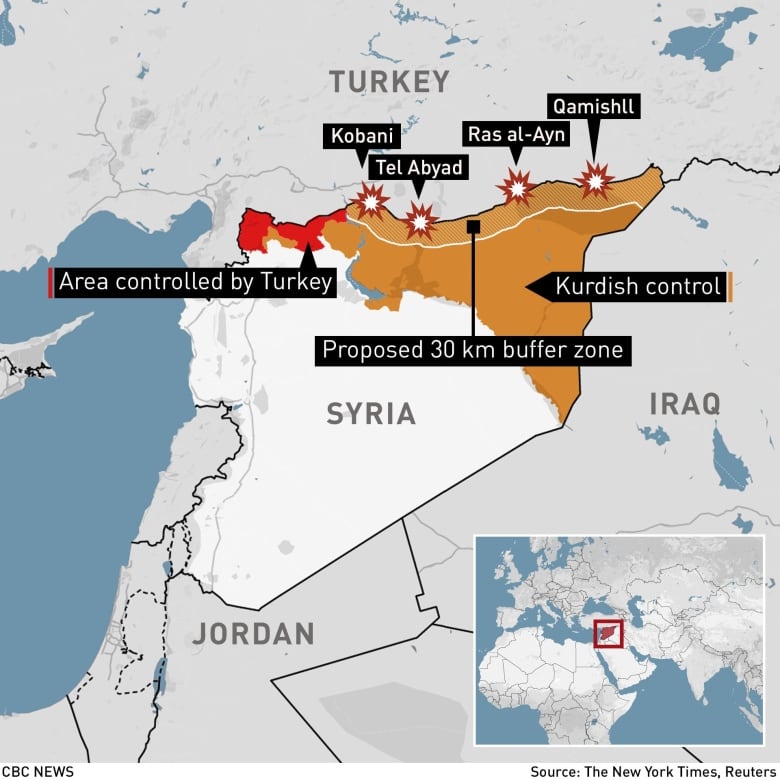Divided UN fails to agree on Turkey's offensive in Syria
Europeans issue their own statement after the meeting, urging Turkey to stop

The divided UN Security Council failed to agree on Turkey's offensive in northeast Syria on Thursday, with Europeans demanding a halt to military action and Syrian ally Russia calling for "restraint" and "direct dialogue" between the two countries.
The five European council members who called the closed meeting would have liked its 15 members to agree on a statement on the Turkish offensive, launched after U.S. President Donald Trump suddenly withdrew U.S. forces from the volatile northeast.
The United States proposed a statement that expressed "deep concern," called for protection of civilians, and asked Turkey to go through diplomatic channels rather than take military action, council diplomats said, speaking on condition of anonymity because consultations were private.
But Russia's UN ambassador, Vassily Nebenzia, told reporters afterward that any Security Council statement needs to take into account other aspects of the Syrian crisis, not just the Turkish operation, and should demand the immediate termination of "the illegal military presence" in the country.
Europeans denounce civilian suffering
So the Europeans issued their own statement after the meeting, urging Turkey "to cease the unilateral military action." They said the offensive threatens progress against the extremist Islamic State in Iraq and Syria (ISIS) by a global coalition, undermines stability of the region and exacerbates "civilian suffering."
Turkey says it is targeting Kurdish fighters, who fought alongside U.S. forces in routing ISIS from northern Syria. President Recep Tayyip Erdogan's government considers the Kurds "terrorists" who are allied with Turkey's outlawed Kurdistan Workers' Party.
U.S. Ambassador Kelly Craft said Trump "has made abundantly clear" that the United States "has not in any way" endorsed Turkey's decision to mount a military incursion in northeast Syria.
As <a href="https://twitter.com/POTUS?ref_src=twsrc%5Etfw">@POTUS</a> has made abundantly clear, the U.S. has not endorsed <a href="https://twitter.com/hashtag/Turkey?src=hash&ref_src=twsrc%5Etfw">#Turkey</a>’s decision to mount a military incursion in <a href="https://twitter.com/hashtag/Syria?src=hash&ref_src=twsrc%5Etfw">#Syria</a>. Turkey is now responsible, & failure to play by the rules, protect vulnerable populations & guarantee that ISIS does not reconstitute will have consequences. <a href="https://t.co/nT2ooSoI7F">pic.twitter.com/nT2ooSoI7F</a>
—@USUNShe told reporters the president has emphasized to Turkey's government that it bears "full responsibility" for protecting Kurds and religious minorities, and for ensuring that ISIS fighters remain in prison and the extremist group doesn't reconstitute itself.
Craft stressed that Turkey's "failure to do so will have consequences." She didn't elaborate.
The council meeting again displayed the inability of the UN's most powerful body to deal with the more-than-eight-year Syrian conflict, which has claimed over 400,000 lives.
The statement by the European council members — United Kingdom, France, Germany, Belgium and Poland — who were joined by Estonia which will join the council in January, was very similar to the European Union's statement issued Wednesday.
'Demographic change would be unacceptable'
The European council members' statement also urged protection of civilians and said "it is unlikely that a so-called 'safe zone' in northeast Syria, as envisioned by Turkey, would satisfy international criteria for refugee return." And it stressed that "any attempt at demographic change would be unacceptable."

Russia's Nebenzia called the Turkish operation "the result of demographic engineering some of the coalition partners did in the northeast of Syria.
"We warned them, [for a] long time, not to experiment with that, and not to try to count Arab tribes that lived initially in that area to be Kurdish," he said. "And now in fact the Kurdish [are] reaping the fruit of their demographic policies in that part of Syria."
Turkey is already declaring success in its military assault as it tries to flush out Kurdish militias that Ankara sees as a security threat.
Turkey's defence ministry says 228 militants have been killed so far in the offensive. The Kurds said they were resisting the assault. At least 23 fighters with the Syrian Democratic Forces (SDF) and six fighters with a Turkish-backed Syrian rebel group have been killed, said the Syrian Observatory for Human Rights, which monitors the war.

The SDF said Turkish airstrikes and shelling have killed nine civilians.
About 64,000 people have fled border towns in northeast Syria since artillery began to rain down in the region Wednesday, according to the International Rescue Committee. The towns of Ras al-Ayn and Darbasiya have become largely deserted.
Watch as smoke rises from the Syrian border towns of Tel Abyad and Ras al-Ayn:
With files from Reuters
